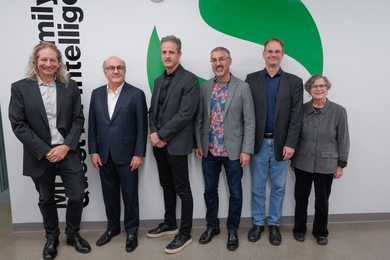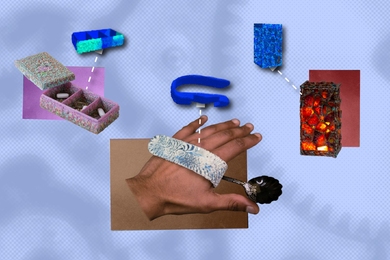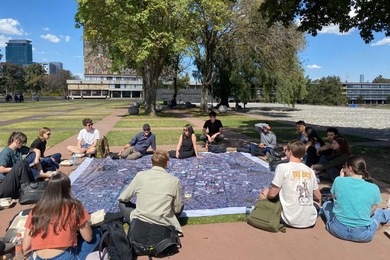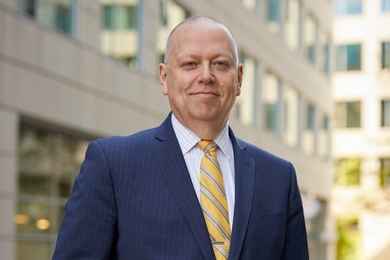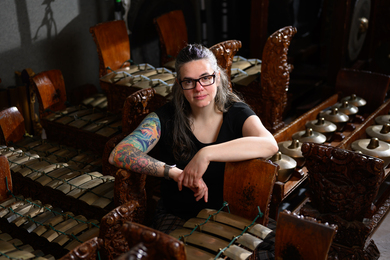Faculty discussion of the new curriculum changes proposed by the Task Force on the Undergraduate Educational Commons continued last week at the Nov. 15 faculty meeting.
About 200 faculty members attended the meeting, which was held in the Stata Center's Kirsch Auditorium. This was the faculty's second chance to discuss the proposed changes, which constitute the most dramatic changes to the MIT core curriculum in the past 50 years.
The recommendations, which include new requirements in science, mathematics and engineering as well as in the humanities, arts and social sciences, also promote an increased role for international educational experiences for undergraduates.
At the beginning of the meeting, President Susan Hockfield announced that the Dec. 20 faculty meeting has been cancelled but another meeting has been scheduled for Nov. 29 to continue discussing the proposed curriculum changes. At that meeting, the faculty will vote on a motion to delay any votes on the proposal until at least February, to give the faculty more time to talk about it.
Steven Lerman, professor of civil and environmental engineering and chair of the faculty, suggested that during the next few months, the faculty officers hold forums and gather comments from other faculty members on the proposed curriculum.
At last week's meeting, the floor was opened for faculty comment and three members of the task force--Dava Newman, Robert Redwine and Charles Stewart--answered questions and responded to comments from the faculty.
Shigeru Miyagawa, professor of foreign languages and literatures, praised the task force's commitment to encouraging international experiences. However, he pointed out that the new program may unintentionally make it more difficult for students to go abroad through the popular MISTI program.
Miyagawa said that students need to take two years of foreign language before they can participate in the MISTI program, but the new curriculum requires students to take three foundational electives in the School of Humanities, Arts and Social Sciences over their first two years.
"This leaves very little time for other HASS courses, including foreign languages," he said.
Students who only take a foreign language during their junior and senior years will not be able to achieve fluency, as they can if they start earlier, he said.
"However unintended we believe this problem is, it's potentially dire," Miyagawa said.
Stewart, a professor of political science, said he agrees this could be a serious issue but he believes there are ways to work it out, including encouraging students who enter with Advanced Placement credit to use that flexibility to start studying a foreign language during their freshman year.
Steven Leeb, professor of electrical engineering and computer science, said he has concerns about the new "menu" structure of science requirements. Each student will choose one course from five of either five or six areas of focus (e.g., chemical sciences, computation and engineering, life sciences, mathematics, physical sciences, and project-based experiences), plus two semesters of calculus and one of physics.
Each focus area will have several different options. For example, electromagnetics (Course 8.02) and a new geophysics class have been put forward as possible equal selections from the physical sciences focus area.
Leeb said he fears the new structure will lead to grade inflation and a tension among classes for entertainment over content. He is especially concerned that, under this proposed menu structure, it is possible for freshmen to make choices that will make them unable to enter all majors at the beginning of their second year. "This proposal would break a fundamental compact that we have had with our incoming undergraduates for more than 50 years," he said.
Robert Silbey, dean of science and chair of the curriculum task force, said he believes the menu system will be just as rigorous as the current Institute requirements. The faculty still need to work out what courses would be in each of the six "boxes."
"We were very careful that these are only suggestions, and it is up to the faculty to decide what is in the boxes," said Silbey. "If we do this right, we could have subjects in these boxes that would be spectacular and rigorous and MIT-quality."
Newman, a professor of aeronautics and astronautics and engineering systems, emphasized that the task force tried to focus on the "critical foundational elements" that students should learn. "There's so much we want all of our students to know--we can't do it all," she said.
Jeffrey Freidberg of the Department of Nuclear Science and Engineering said he believes many very smart U.S. undergraduates, including those from MIT, enter more technical graduate programs without sufficient math and science preparation to succeed on day one, and their preparation is substantially weaker than that of students from elite international universities.
"Shouldn't we have the possibility of a 'nerd track' in our GIRs, so to speak, where undergraduate students could take more math and science subjects, and aspire to be like Richard Feynmann rather than an industrial CEO, national lab director or manager in government?" he suggested.
Redwine, a professor of physics, responded that the task force had considered the possibility of de-emphasizing HASS courses, but the members strongly agreed not to do that.
Stewart pointed out that MIT's charter calls for it to "be in the world and provide leadership," summarizing the aspiration of MIT founder William Barton Rogers. Although it is now possible for students to create their own "nerd track," "We do have a particular mission, and part of it's reflected in the HASS requirements," he said.
David Trumper of the Department of Mechanical Engineering said he believes the proposal will "eviscerate" MIT's curriculum and tries to accomodate too many competing agendas. In particular, he is concerned that the plan puts international study on an equal footing with changes in the common math and science curriculum. "I want this to be the best damn science and engineering and biology education in the world, and I would sacrifice many things for that," he said.
David Mindell of the program in science, technology and society, a member of the task force, suggested that the faculty immediately adopt one of the recommendations, which is to eliminate the 90-unit penalty for double majors. That would be easy to implement and would have a huge impact on many students, he said.
Lerman ended the discussion portion of the meeting at 5 p.m. and encouraged those who still want to speak to come to the next meeting.
Fundraising campaign
Hockfield told the faculty that a new fundraising campaign, a focused "Campaign for Students," will be officially launched in December at the next meeting of the MIT Corporation. The five-year campaign, which will be led by Chancellor Phillip Clay, aims to raise at least $500 million for four areas that impact students.
The four areas are:
- Undergraduate financial aid, which Hockfield said is now underendowed, resulting in the use this year of about $20 million in unrestricted funds.
- Graduate financial aid, which currently does not provide a fully funded first year for all doctoral students.
- Infrastructure for teaching, including classroom technology, lab renovation, and resources to offer more project-based courses.
- Student life.
The conclusion of the campaign will coincide with MIT's 150th anniversary, which occurs in 2011.
"I think it will provide a beneficial focus on the importance of MIT's living and learning communities for our undergraduate and graduate students," Hockfield said.
A version of this article appeared in MIT Tech Talk on November 22, 2006 (download PDF).
